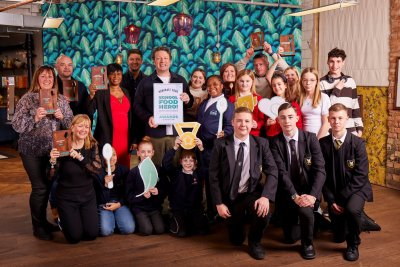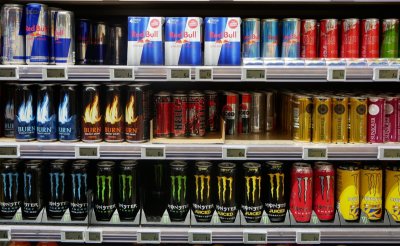News • Children's Food Campaign
New survey shows dried-up state of drinking fountains in UK's parks
 As children around the country enjoy the first break of the summer, a survey published today by the Children’s Food Campaign finds that the vast majority of public parks around the UK have no public drinking fountains. This encourages thirsty children to turn to sugary alternatives or go without, both of which are bad for their health.
As children around the country enjoy the first break of the summer, a survey published today by the Children’s Food Campaign finds that the vast majority of public parks around the UK have no public drinking fountains. This encourages thirsty children to turn to sugary alternatives or go without, both of which are bad for their health.
The survey of 140 parks around the UK found only 11% had fountains, and in only two thirds of these parks were any of the fountains working. Only eight parks – barely 6% of the survey - had every fountain working. Yet the survey also found that the great majority of people would be happy to use drinking fountains if they were available.
Children’s Food Campaign Coordinator Christine Haigh said:
“Health professionals advise water is the best thing for thirsty children to drink yet we make it hard for them by failing to provide water fountains in parks. Drinking fountains are a cheap and easy way of improving public health. It’s not rocket science - the Victorians were way ahead of us on this issue!”
Dr Vivienne Nathanson, Head of Science and Ethics at the British Medical Association, said:
“At a time when we are fighting an obesity crisis in the UK, it is essential children readily have access to free, safe drinking water in schools and public parks. The results of this survey show we are failing to provide any incentive to children to reduce their intake of sugary soft drinks which we know can lead to major health problems including obesity and poor dental health. With children particularly susceptible to dehydration in hot weather and when physically active, encouraging them to drink more water will also improve their general physical and mental health by helping them to stay hydrated throughout the day.”
Professor Richard Parish, Chief Executive of the Royal Society for Public Health, said:
“Access to clean water is essential for our wellbeing and health. Drinking plenty of water keeps you hydrated, which in turn can improve mental and physical performance, as well as aiding proper digestion. Too little water can lead to headaches. Water, which is calorie free, is an excellent alternative to soft sugary drinks and will help combat obesity and tooth decay. You cannot go wrong with water!”
Christine Blower, General Secretary of the National Union of Teachers, said:
“It is tragic that even in the handful of parks that have drinking fountains so few are actually working, meaning that children can turn to expensive and unhealthy sugary drinks instead of drinking water, which we know is best for children’s health. Local authorities should commit themselves to installing and repairing drinking fountains in the interests of children’s health and well being.”
Friends of the Earth Executive Director, Andy Atkins, said:
“Councils around the country should be pulling out all the stops to help people to make greener choices – providing fountains in parks is an easy way to do this. Refilling a re-usable bottle at a drinking fountain is an easy way for all of us to minimize waste and cut our carbon footprints - bottled water is often shipped and trucked over long distances which produces climate-changing emissions while disposing of empty bottles creates unnecessary waste.”
Dame Yve Buckland, Chair of the Consumer Council for Water, said:
"Over half of water customers tell us that they would use public drinking fountains if they were more readily available. Water customers in England and Wales have invested over £85 billion since privatisation in a system that brings tap water of an extremely high quality straight to their homes. It should also be easy to access when they are out and about, and we would support this initiative to help make fresh, clean tap water more readily available in public places."
Vicky Lawson of Weight Concern said:
"The Children's Food Campaign's Drinking Water in Parks campaign is a fantastic and imaginative way of making a practical difference to the wellbeing of children. Weight Concern hopes that lots people will get involved to help make drinking water freely available in parks around the country."
The survey is published as the Children’s Food Campaign launches its campaign for drinking water in all public parks.
Ends
For further information and interviews, please contact Jackie Schneider/Christine Haigh on 0203 5596 777 or 07795 213425 (Jackie) / 07870 577934 (Christine) or Jackie@sustainweb.org / Christine@sustainweb.org
The full report is available to download at here.
Notes to editors:
1) The Children's Food Campaign wants to improve children's health and well-being through better food - and food teaching - in schools, and protecting children from junk food marketing. We are supported by over 300 organisations and 12,000 members of the public. The Children's Food Campaign is coordinated by Sustain: the alliance for better food and farming and funded by the British Heart Foundation.
2) For more information about the campaign, visit https://www.sustainweb.org/childrensfoodcampaign/waterinparks
3) The Children’s Food Campaign showed last year that many popular soft drinks contain more calories than the exercise children burn in an hour of exercise, meaning that children could end up unhealthier than they started after a trip to the park. The Children’s Food Campaign calculated that, for example:
- a 500ml of Lucozade Energy Orange, which contains the equivalent of almost 14 teaspoons of sugar, means a child would have to play football for one and a half hours to burn the calories it contains;
- a 500ml bottle of Fanta Fruit Twist, with around 13 teaspoons of sugar, would take the average nine-year old child more than an hour of football playing to burn off.
And when children are tempted to buy a snack to accompany their drink, the calories consumed can easily rise to more than two hours of continuous exercise. For more information, see https://www.sustainweb.org/news/water_for_children_in_parks
4) 70% of respondents (whether or not their park had any drinking fountains) said they would be happy to use fountains. Of those who said they wouldn’t be, the main reason stated (by 60% of those not happy) was that there weren’t any to use. Only about 10% of respondents who answered this question had concerns about the installation or use of fountains: eight expressed concerns about hygiene, and three about vandalism. 92% of respondents said that they would prefer children to quench their thirst for free at the park, rather than pay for bottled drinks.
5) The survey was conducted between July and September 2009, when the Children’s Food Campaign asked its supporters to visit their local public park to report on the provision of drinking water. They were provided with a simple questionnaire and were asked to feed back their findings, either by filling in an online survey available through the Children’s Food Campaign website, or returning their completed questionnaire by post.
6) Bottled drinks, including bottled water, have a significant environmental impact. The carbon footprint of some brands of bottled water has been calculated to be at least 600 times greater than water from the tap, and 27 million tonnes of plastic are used annually to bottle water worldwide (Refs: http://www.telegraph.co.uk/earth/earthcomment/3325973/Bottled-water-eau-no.html, http://www.guardian.co.uk/environment/2008/feb/10/water.foodanddrink).
7) Tap water can be 500 times cheaper than bottled water (Ref: http://www.ciwem.org/policy/policies/bottled_water.asp).
Published Monday 31 May 2010
Children's Food Campaign: Better food and food teaching for children in schools, and protection of children from junk food marketing are the aims of Sustain's high-profile Children's Food Campaign. We also want clear food labelling that can be understood by everyone, including children.





